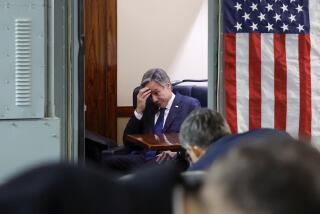U.S. Seeks to Clarify Aidid Policy : Somalia: Clinton Administration says it is no longer actively seeking warlord’s arrest but would not rule it out. Leading members of Congress are still dissatisfied.
- Share via
WASHINGTON — The Clinton Administration tried Sunday to clarify its new policy of seeking Somali warlord Mohammed Farah Aidid’s cooperation instead of his arrest, but leading members of Congress were still dissatisfied with the explanations.
Secretary of State Warren Christopher and Defense Secretary Les Aspin, going public with a policy shift that had been signaled only privately before, said the United States is no longer actively seeking Aidid’s arrest and will leave his fate to an inquiry run by the presidents of other African countries.
“The focus has shifted,” Christopher said on NBC’s “Meet the Press.” “The focus is now on trying to get a political settlement in the area.
“With respect to the apprehension of Aidid, let me say this,” Christopher added. “I think it would be very much in the interests of that area if a commission were set up by the African leaders” to investigate the charges against the warlord.
Both Christopher and Aspin said they would not rule out arresting Aidid if the Somali clan chief somehow fell into the hands of U.N. forces.
But Aspin made it clear that the United States is no longer actively working toward that goal. “We have a different set of priorities,” he said on ABC’s “This Week with David Brinkley.” “. . . We are not ruling out anything, but we are doing different things” besides seeking Aidid’s capture.
That wasn’t clear enough for Senate Armed Services Chairman Sam Nunn (D-Ga.) and other congressional leaders, however.
“I think we have to clear up some ambiguities,” Nunn said. “We need to tell our military exactly what it is we want them to do and what they should not be doing.”
An ABC News poll released Sunday found that 68% of the public agrees, saying President Clinton has “no clear policy” in Somalia.
Two leading opponents of the growing U.S. military deployment in Somalia, Sens. Bill Bradley (D-N.J.) and John McCain (R-Ariz.), said they will continue pressing for an immediate withdrawal of American forces from the area.
“Frankly, I’m more confused than I was before,” McCain said on CBS’s “Face the Nation.” “The fact is, this is a policy that is in incredible disarray. The American people don’t understand it. . . . I frankly do not understand how you can, on the one hand, tell this warlord that you want to negotiate with him and at the same time keep a price on his head. That just doesn’t make much sense to me.”
The skepticism spilled over to other issues as well, causing problems for the Administration on its policies in Haiti, Bosnia-Herzegovina and even its vaunted health care initiative, senators said.
Nunn said the experience of recent weeks in Somalia, where at least 15 U.S. servicemen were killed in abortive attacks on Aidid’s forces, has fed his doubts about other peacekeeping missions.
He strongly protested an Administration decision to send 600 troops to Haiti as part of a U.N. peacemaking initiative, saying: “I’m concerned about it because it’s a very hostile environment with people obviously killing each other . . . and yet we’re sending forces in there without any kind of arms at all. They’re not really being defended except by very small arms.”
The Haiti force is made up mostly of military construction engineers equipped with M-16 automatic rifles but no heavy machine guns or armored vehicles, officials said.
The Clinton Administration has also indicated that it would send troops to Bosnia to police a peace pact, if one is forged in the troubled Balkan nation.
Senate Minority Leader Bob Dole (R-Kan.) said the controversy over sending U.S. troops abroad has even affected Clinton’s drive to enact a universal national health care plan.
“It’s already lost momentum, no question about it,” Dole said. “I mean, it’s off the front page; it’s on page eight or nine.”
Administration officials acknowledged that the complexity of the U.S. position on Somalia has made it difficult to explain. “Within a day or two, people will say: ‘Now I get it,’ ” one senior official predicted hopefully.
The Administration decided to stop actively pursuing Aidid’s arrest in hopes of both obtaining the warlord’s cooperation in talks to stabilize Somalia and halting his battles with the United Nations long enough to begin withdrawing the American contingent.
But the Administration also says it still supports Aidid’s arrest--an apparent contradiction--for two reasons: to keep the Somali warlord on the defensive and to avoid repudiating the U.N. Security Council resolution that demands his arrest.
“If we were to announce openly that we were no longer trying to capture Aidid, he would have a lot more freedom of movement and a lot more ability to make mischief,” the official said. “It is important that he believe that his options are narrowing.”
In Mogadishu on Sunday, about 2,000 Somalis paraded through the streets, chanting “Aidid, Father of Peace,” in support of his call for a truce. The demonstrators shouted slogans against the United Nations and the United States, said Maj. David Stockwell, the U.N. military spokesman.
The march took place as U.S. tanks and troops rolled off huge transport planes. Later, explosions boomed on the outskirts of Mogadishu as night fell. The Reuters news agency reported that the noise came from an attack by American planes on unspecified targets.
Also Sunday, U.S. special envoy Robert B. Oakley held talks with members of Aidid’s powerful Habr Gedir clan, but not Aidid himself.
A U.S. official said the envoy is under instructions to avoid dealing with Aidid “because he is a fugitive from justice.” But the Administration also wanted to signal to the warlord and his powerful clan that it is not trying to exclude them from political power.
More to Read
Sign up for Essential California
The most important California stories and recommendations in your inbox every morning.
You may occasionally receive promotional content from the Los Angeles Times.











